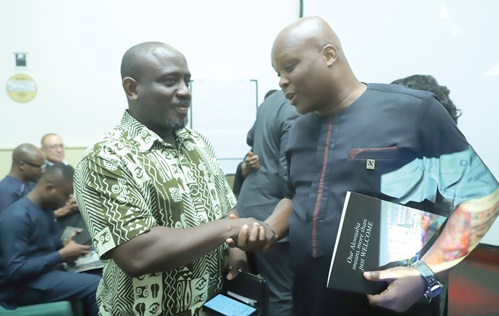Development Bank Ghana (DBG) has expressed its readiness to make significant contributions to the country’s development agenda as a financier and a long-term driver of structural transformation.
DBG’s Chief Executive Officer, Dr Randolph Nsor-Ambala, who articulated the bank’s position at a policy dialogue in Accra yesterday, said through partnerships, policy alignment and inclusive finance, the bank was laying the groundwork for a competitive and resilient economy.
It was on the theme: “Revamping Ghana’s textiles and garment sector – The challenges, pitfalls and opportunities.”
Participants discussed and identified key policy bottlenecks, pitfalls and opportunities within the textile and garment industry.
The forum was aimed at formulating policy recommendations to accelerate growth in the sector.
DBG held the dialogue in collaboration with the Association of Ghana Industries (AGI) to chart a clear reform roadmap for the country’s textile and garment sector.
The sector, which is one of Ghana’s most strategic manufacturing segments, was once a pillar of national employment and industrial strength.
However, its workforce has declined from over 25,000 direct jobs in the late 1970s to just 6,000 as of 2020.
They included senior policy-makers, financiers, development partners and factory owners who discussed issues like how cheap imports, uneven customs enforcement and fragmented incentives had eroded competitiveness, while outlining a suite of reforms to restore momentum.
Obligations
The CEO further said that as an organisation aligned with the country's long-term development agenda, the bank played a crucial role in advocating the industry’s concerns to policymakers supported by evidence and empirical data.
He said the bank's obligations were in threefold, including acting as an anchor to mobilise funding, a key challenge in the textiles industry.
Dr Nsor-Ambala said the bank also provided technical assistance, recognising that funding alone was insufficient to drive growth in the sub-sector.
He said the bank was also working collaboratively with its participating Financial Institutions (PFIs) to identify five investor-ready, bankable project pipelines that could be supported.
It was also conducting a comprehensive capacity needs assessment to inform the design of technical assistance programmes for both industry players and financial institutions.
Stable regime
The President of AGI, Dr Humphrey Kwesi Ayim Darke, urged the government to deliver a stable, export-oriented incentive regime, saying manufacturers were poised to invest once clear rules were in place.
He said a sector-wide feasibility study would be commissioned to address the chronic lack of industry intelligence — mapping the entire value chain from raw material cultivation to fabric processing and garment production.
Draft policy
The Chief Director of the Ministry of Trade, Agribusiness and Industry, Noah Tumfo, said the government was set to unveil a tailored package to support the rollout of the 24-Hour Economy initiative to provide industries with opportunities to leverage its benefits.
He also said that the ministry had drafted a policy document to boost the textiles and garments industry, a key component of the government's 24-Hour Economy policy.
The draft Ghana textiles and garments manufacturing policy when completed after stakeholder inputs, would lead to the creation of a well-developed textiles and garments value chain, with the potential to accelerate the country's industrialisation, export diversification and employment opportunities, Mr Tumfo said.

